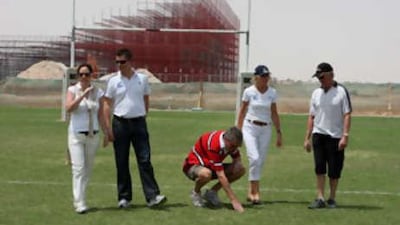DUBAI // The man tasked with delivering the new rugby facility for Dubai, Gary Chapman, shelters from the sun underneath the rickety scaffolding tower he has just descended, then observes: "I'm still alive." His statement goes beyond the precarious adventure of the previous minutes, when he was part of a group given a bird's eye view of the construction site from a creaking, 50ft high, temporary lookout.
It was all "perfectly safe" according to the man who erected the tower, Rob Hodson - and he knows a thing or two about it. The project manager has been assembling his giant Meccano set at the Emirates Airline Dubai Rugby Sevens for the past eight years. When the event takes place at its new home for the first time in November, his scaffolding stands will seat the majority of the main ground's 42,500 spectators.
In fact, Chapman's observation about the agreeable state of his health referred back to what he had said nearly two years previously. At the pre-tournament press call on the eve of the 2006 Rugby Sevens, Chapman had stated the event would move away from its long-term home, the Dubai Exiles, "over my dead body". Up until then, there had been much debate about how long the Exiles - as well as the neighbouring Dubai Country Club and Darjeeling Cricket Club - would be able to fight against Dubai's rapid urban sprawl.
Sure enough, one year on Chapman was left lamenting the demise of the club, which since has been gobbled up to make space for the Meydan mega-project. He predicted a "few tears will be shed" when the bulldozers arrived to rip up the Exiles, which happened the day after the 2007 Rugby Sevens finished. Now, however, he declares he is over it. "It was a bit of a surprise that the old Exiles site was taken for development," says Chapman, president, Group Services and Dnata, Emirates Group.
"These things happen, and, true to form, Dubai Inc came up with an alternative site. It [the new ground, catchily named The Sevens] will be a great way of enhancing everything that goes on in Dubai and in the region for the rugby community, and for the Sevens." The Dubai Rugby Sevens has been the highlight of the Gulf sporting calendar for nearly 39 years, ever since the Staffordshire Regiment were crowned the inaugural champions on the sand in Al Awir in 1969. Much of its allure has derived from the unique atmosphere created at the iconic Exiles ground, which was situated near the crossroads of Al Khail and Dubai-Al Ain roads.
With temporary stands, social tournaments and the freedom to roam easily between the main ground and the outside fields, the Exiles leant the event a village-green feel that could not be replicated at any modern, super-stadium. The blueprints for the new home were drawn up with that special ambiance in mind. Yet Chapman admits he struggled to envision the atmosphere surviving the move just by looking at plans on a piece of paper. "When you do the plans, and you start to scope this thing out, it is not quite as tangible," he says.
"When you actually come out here and see what is going on, you start to picture it, especially when you get a view from a height, you see it coming together. It is a very large project. The area we have is more than three times the size of what we had before. That is great - having that space is a luxury and we are able to enhance and take things forward." The IRB's tournament operations manager Beth Coalter and the head of the Rugby World Cup, Kit McConnell, were back to view the site for a second time at the weekend.
During their first visit, in May, they were given an overview of the facility via helicopter. Afterwards, Coalter commented: "We were very impressed that there is going to be a stadium in five months time. "It is basically just a drawing in the sand, but it is very exciting. I don't think this could happen anywhere else than Dubai." At the time, that seemed highly optimistic. Just three months ago, there were two pitches in place for the Gulf's club sides to play on, but very little else. The surrounding ground had barely been broken and only one crane - if Dubai residents can possibly imagine that - was on the site.
The difference now is startling. The structure of the main grandstand, which will have a capacity for 4,000 permanent seats, is not far from being complete. The grass has been laid on all the pitches, and the two-storey, 80metre long clubhouse - which house the new permanent office of the Arabian Gulf Rugby Football Union - is taking shape. It no longer requires an especially great leap of imagination to picture packed stands swaying to the strains of Neil Diamond's Sweet Caroline, while New Zealand and Fiji belt sevens bells out of each other on the field. The IRB have much faith in Dubai. Not only does the regular tournament kick off their annual World Series, but next March the city will also be hosting the Sevens World Cup, which is expected to be the biggest event in the history of the abbreviated form.
"Gary has been sending us photographs, just to reassure us that things are progressing really well," says Coalter. "I think it is even more exciting seeing what has gone on. " The prospect of preparing a new venue for two major tournaments in one season - the regular Sevens at the end of November, then the World Cup from March 5-7 2009 - is a tough one. There is a workforce of 1,250 people at the site, and Chapman adds: "It puts its demands on everyone. It has more than tripled the workload. But the people are committed, driven and enthusiastic. With that recipe, it will happen."
@Email:pradley@thenational.ae


